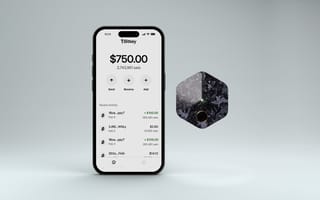When cryptocurrency exchange FTX collapsed in late 2022, the global bitcoin community came face-to-face with one of society’s greatest concerns: financial security.
As the aftermath of this historic event continues — promulgated by the dissolution of major crypto services and the criminal conviction of FTX founder Sam Bankman-Fried — many bitcoin owners have grown weary about leveraging exchanges and custodial wallets to preserve their finances.
According to Thomas Templeton, a Proto lead at Block, the alternative, self-custody solutions carry their own set of complications, including: the complex set of devices or long passwords that people need to remember to recover their money; the sight-sensitive passwords used to recover access to crypto wallets can be lost or stolen; and the general fact that many bitcoin owners feel anxious about self custody.
To confront these challenges, Templeton’s Proto team developed Bitkey, a self-custody wallet designed to be a safe and easy-to-use alternative to other self-custody solutions. It comes with three parts: a mobile app, a hexagon-shaped hardware device and a set of recovery tools.
“Bitkey is a self-custody bitcoin wallet designed to empower the next 100 million people using bitcoin to truly own and manage their money as well as support the payments use cases we expect bitcoin to increasingly uphold,” he explained.
For Block, the development of Bitkey is more than an engineering milestone. Templeton noted that the company expects the product to play a significant role in shaping a more empowering economic future.
“We believe that, in the future of our global, digital economy, customers will demand ownership and control, and thus self-custody wallets will become the norm,” he said. “It brings peace of mind, reduces dependence on any one company and puts customers in true control of their own money.”
UNLOCKING ECONOMIC EMPOWERMENT
Block, Inc. is a global technology company with a focus on financial services. Made up of Square, Cash App, TIDAL and TBD, Block builds tools to help more people access the economy. Proto is an internal team at Block, whose mission is to accelerate the world's transition to a more open economy with products that increase access and independence for everyone. Bitkey is the first product from the Proto team.

Creating Safety And Control
Giving people complete control and ownership over the keys that give them access to their bitcoin is vital. But today, accessing self-custody solutions where people can truly own the keys is still difficult.
Templeton explains that “a critical part of making self-custody more accessible is providing forgiving recovery experiences that prioritize both simple and secure paths to help customers recover their money when something goes wrong, without the burden of having to remember long passwords.”
It’s for this reason that Bitkey designed its keys differently. Bitkey is a two-of-three multi-signature wallet, meaning there are three keys in the system, but any two of them need to work together to approve transactions and recovery actions. The customer always holds two keys — the one in the mobile app and the one in the hardware device — while Bitkey holds one, so the company can never move money without a customer’s involvement.
“This technical design empowers customers with safety and security and gives them control,” Templeton said.
“This technical design empowers customers with safety and security and gives them control.”
In building such a complex solution, Templeton and his teammates didn’t simply rely on cutting-edge technology and globally-distributed expertise. He said customer research and feedback played a large role in the development process.
Leveraging research data from 1,400 custodial bitcoin holders in seven countries, Templeton’s team uncovered some telling statistics. For instance, their research showed that 33 percent of custodial wallet users don’t know how private keys work, while 30 percent don’t fully understand self-custody wallets. Given this data, he noted that more work needs to be done in the industry to educate customers about self-custody solutions, and companies need to build easier products to bring more people to self custody.

Additionally, to further glean insights, Templeton and his peers have conducted both internal and external betas to gain feedback on how the product is currently performing and its user experience as they continue to iterate on existing and new features that are in the works. One of the features that received a more positive feedback during the external beta was the integrations with Coinbase and Cash App, which make it easier and safer to transfer bitcoin from those custodial platforms to Bitkey.
“This gives us greater excitement about our hypothesis that self-custody will become the norm of managing bitcoin — if we can partner successfully with exchanges that separately specialize in buying and selling while Bitkey specializes in giving customers a way to manage the keys of their bitcoin ownership,” Templeton said.
‘THE TRUE VALUE OF BITCOIN AROUND THE WORLD’
Templeton said that Bitkey aims to perpetuate “the true value of bitcoin around the world,” not just in the Global North (a grouping of nations defined by economic prosperity and industrial development). So when Templeton’s team interviewed several customers outside of the United States, they were excited to hear how this ambition has become a reality for many. “We spoke to a number of customers in markets like Argentina and Nigeria who told us about hyperinflation in their own local currencies or the burdens they face with remittances and how bitcoin becomes a way for them to save for their future as well as manage cross-border payments with their friends and family in other countries,” he shared.
An Open Approach to Innovation
With team members spread across multiple continents developing products as quickly as possible, Templeton and his peers can’t afford to keep their innovation behind closed doors — and they don’t want to.
An open development approach is central to Templeton’s team, enabling them to drive progress on a wider scale.
“We develop products in the open, inviting scrutiny early and often and welcoming input from external communities and within Block,” he said. “This approach will help us build both better products and trust.”
According to Templeton, it’s essential for his team to share their thought processes, designs and implementation details so that people can understand — and verify — how their products work. But besides that, leading open discussions will help the company establish a more accessible ecosystem of global and regional partners, which will ultimately benefit customers in new ways.
For Templeton, those who join his team have access to unique opportunities, not only because of the novelty of the company’s products and its focus on open innovation. Future team members get to join an “ecosystem of ecosystems,” in which they’ll find the soul of a scrappy startup — and a far-reaching horizon.
“It’s very rare to work in a global, publicly-traded company that wants to invest in long-term big bets in a meaningful way,” Templeton said.






